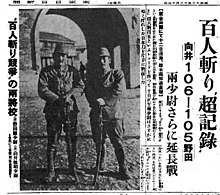
| This article is part of the series on the |
| Nanjing Massacre |
|---|
| Japanese war crimes |
| Historiography of the Nanjing Massacre |
| Films |
| Books |
The hundred man killing contest (百人斬り競争, hyakunin-giri kyōsō) was a newspaper account of a contest between Toshiaki Mukai (3 June 1912 – 28 January 1948) and Tsuyoshi Noda (1912 – 28 January 1948), two Japanese Army officers serving during the Japanese invasion of China, over who could kill 100 people the fastest while using a sword. The two officers were later executed on charges of war crimes and crimes against humanity for their involvement.[1]
The news stories were rediscovered in the 1970s, which sparked a larger controversy over Japanese war crimes in China, particularly the Nanjing Massacre. The modern historical consensus is that the stories did not occur as they were described.[2][3] The original accounts printed in the newspaper described the killings as hand-to-hand combat; however, historians have suggested that they were most likely a part of Japanese mass killings of Chinese prisoners of war.[4][5]
- ^ Takashi Yoshida. The making of the "Rape of Nanking". 2006, p. 64.
- ^ Fogel, Joshua A. The Nanjing Massacre in History and Historiography. 2000, p. 82.
- ^ Wakabayashi 2000, p. 307.
- ^ Honda 1999, p. 128.
- ^ Kajimoto 2015, Postwar Judgment: II. Nanking War Crimes Tribunal.